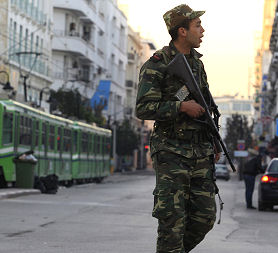Uneasy calm in Tunisia as power talks continue
Security forces and public militias are guarding the streets in Tunisia while politicians from all sides attempt to form a unity government, following the departure of President Ben Ali.
Following a day of drive-by shooting, jailbreaks and sporadic looting, Tunisian military forces and members of the public have been keeping a fragile peace on the streets of Tunis.
Light gunfire was heard overnight but it was much reduced compared to that of previous nights.
“Last night we surrounded our neighbourhood with roadblocks and had teams checking cars. Now we are in the process of lifting the roadblocks and getting life back to normal” said one man, Imed.
The Tunisian blogger. atunisiangirl, records how on a morning walk in the suburbs of Tunis today she found many roadblocks setup by residents to fend off criminal gangs, and that some residents had been killed by men in an ambulance who appeared to be part of the former presidential guard.
She writes:
“Outside the house , in the metro station the inhabitants arrested 3 gangsters who were trying to attack them and their house. The angry inhabitants arrested them . They were waiting for the army to come and take them or their corpses away.”
For the first time in days today, commercial vans and traffic have been seen delivering goods around the capital city.
In the centre of Tunis, one resident said:
“We are coordinating well with the military and we are beginning to feel some security,” said Samir, a 26-year-old in the centre of Tunis. Nearby, local women were bringing cups of coffee to men who had spent the night in the street guarding against violent gangs.
Gunmen, believed to be Ben Ali loyalists, fired at random from cars in Tunis on Saturday.

Power talks
Yesterday the speaker of parliament Fouad Mebazza asked Prime Minister Mohammed Ghannouchi to form a unity government and run presidential elections in the next 60 days.
Ahmed Ibrahim, head of the opposition Ettajdid party, said:
“The main thing for us right now is to stop all this disorder. We are in agreement on several principles concerning the new government. We will continue to discuss. “
Opposition parties want assurances that presidential elections will be free, that they will have enough time to campaign, that the country will move towards greater democracy and that the power of the ruling RCD party will be loosened.
However, two opposition parties have also already said the two-month deadline for holding elections is too soon.
Earlier, Tunisian expert Dr Larbi Sadiki told Channel 4 News that 60 days would not be “enough to prepare for a democratic breakthrough”.
He said:
“The key challenge now is to clarify what would be the objectives of any elections held in three months. I fear that holding elections for the sake of elections, or because the constitution says so, might need re-thinking.”
Opposition leader Najib Chebbi said after talks with Ghannouchi on Saturday that elections could be held under international supervision within six or seven months.
Meanwhile the Foreign Office has said that of the 6,000 Britons that were in Tunisia before the protests started, there are less than half left with a further 1,500 expected to leave in the next 24 hours.
Analysis: what next for Tunisia?
Middle East expert Dr Larbi Sadiki tells Channel 4 News what ridding itself of a 'Marcos-like' regime means for Tunisia.
Read more: Tunisia: this is not a time to be 'triumphant'